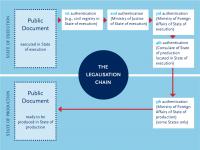Document Authentication and Legalization Requirements in Canada
Nov
16
2015
English
Appostille in Effect in Canada
Hague Convention (Apostille) comes into effect in Canada on January 11, 2024.
Since that date authenticated documents include a standard certificate called an apostille. The apostille eliminates steps required to get documents accepted in countries where the convention is in effect, including the legalization by a consular office of the country of destination. This will simplify and speed up the acceptance of Canadian public documents in the more than 120 countries that have signed the Hague convention 1961. Apostille process also is more time and cost effective than standard consular legalization, as you can save your money for official embassies fees.
Despite apparent simplicity of the Apostille process there are plenty of nuances that depend on the type of the document and country where the document would be used.
Please be advised that standard consular legalization at the embassy (2 steps process) is still needed for documents that originated in Canada if they are used in the countries that do not sign Hague Treaty 1961.
So called chain legalization process still exists between Canada and other countries for acceptance of public documents with countries are not signed the Hague Convention 1961. The legalization is used in lieu of apostille that is only acceptable when two countries both joined the Hague Convention.
Source: www.hcch.net
Source: www.hcch.net
Usually, the chain legalization in Canada for Canadian public documents to be used abroad involves 3 stages(hover or click on the diagram to the right):
-
Notarization with Canadian Notary or Lawyer
-
Federal authentication at the Global Affairs of Canada ( former Department of Foreign Affairs and International Trade (DFAIT)
-
Consular legalization at a foreign embassy
Canada Legalization Services© can assist you with all the above 3 steps. Please use respective links to the left for a particular service type in Canada and associated service fees.
Or if you need the "reverse" process of the above, i.e., for your foreign (non-Canadian) public documents to be either officially recognized in Canada or certified in Canada as "intermediary" stage for further legalization in a foreign embassy, please request a quote as we can also provide your such services. For example, newcomers to Canada often need their educational credentials to be accepted for employment in Canada. Or sometimes persons with non-Canadian documents who due to their Canadian residence but employment overseas are unable to authenticate their documents in the country of origin. For example, a South African citizen permanently living in Canada may need to legalize his/her original diploma from South Africa for work permit/licence in Kazakhstan.
Furthermore, it is quite rare but sometimes foreign countries may require additional duplicate authentication/legalization steps in their own countries - a process often referred to as "superlegalization" when such already legalized document is additionally authenticated in a Canadian Embassy/Consulate abroad with final legalization in a foreign ministry.
Canada Legalization Services© can assist you with all your document needs in Canada. We can provide you full package of services whether it is DFAIT authentication or legalization at a foreign embassy. Please use the respective links to the left in the main navigation for specific requirements or contact us for additional information.Or you can use the Quick Links to the right for typical documents that many Canadians need legalized for foreign use such as e.g., Police Certificate, Medical Fitness Certificates, Canada Revenue Agency Tax Residency Letters, etc.
Vote for this article:
No votes yet

